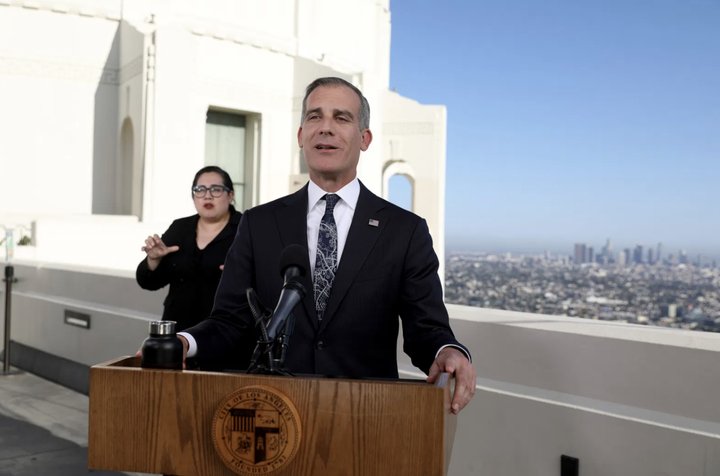
Mayor Eric Garcetti announced today Los Angeles will form a reparations committee as part of a national coalition with other big city mayors. Photo by Gary Coronado, Los Angeles Times via AP/Pool
Eleven mayors, including two in California, announced today their commitment to support federal reparations legislation and establish pilot programs for Black residents in their cities as part of a new nationwide coalition.
The mayors of Los Angeles and Sacramento will join nine other mayors, from cities as populous as Denver to tiny Tullahassee, Okla., one of the oldest surviving Black towns in the West, on the Mayors Organized for Reparations & Equity coalition.
The Los Angeles mayor and Black members of the city council will also convene a seven-member Reparations Advisory Committee, which will recommend the goals and format of a reparations pilot program in Los Angeles and make suggestions on how to pay for it.
On Thursday, President Biden signed a bill establishing Juneteenth, the date marking the end of slavery, as a federal holiday being observed today, which he hopes adds momentum to discussions and recommendations underway across the nation to address racial injustices going back centuries.
Juneteenth builds momentum for reparations
Earlier this month, a nine-member state reparations task force met for the first time to study the consequences of slavery and systemic racism against African Americans in California. The state committee is planning to spend the first year studying the lasting impacts of slavery, while recommending how the state should make amends in its second year.
More than 2.5 million people identify as Black or African American in California, about 6.5% of the overall population. But by many measures, Blacks have lower attainment on education, homeownership and wealth. They account for more than 40% of California’s homeless population and experience worse health outcomes.
Reparations advisory commission
LA Mayor Eric Garcetti selected four of the seven-member advisory commission, including Michael Lawson, a former ambassador and president and CEO of the Los Angeles Urban League; Charisse Bremond-Weaver, president and CEO of Brotherhood Crusade; Mark Wilson, founding executive director of the Coalition for Responsible Community Development; and Khansa Jones-Muhammad, co-chair of the Los Angeles chapter of the National Assembly of American Slavery Descendants.
Black members of the city council members named Mandla Kayise, an expert on economic and land use development; Katrina VanderWoude, president of Los Angeles Trade Technical College; and Cheryl Harris, a leading scholar of critical race theory and systemic discrimination at UCLA School of Law.
This article is part of the California Divide, a collaboration among newsrooms examining income inequality and economic survival in California.
###
CALmatters.org is a nonprofit, nonpartisan media venture explaining California policies and politics.
CLICK TO MANAGE